By law to a common goal
- 73 views
Вторник, 1 марта 2022 года № 41 (29668)
Speaking about the construction of a new Kazakhstan, Doctor of Law, Professor Bauyrzhan Dzhandarbek believes that jurisprudence and law, like other sectors of science, despite emerging difficulties and obstacles, should develop freely, without regard to politics.
According to Bauyrzhan Dzhandarbek, hundreds of laws have been adopted in the country over the past decades, but their repeated changes indicate that the initial version of state documents was adopted in its raw form.
– Today we live according to the Constitution of 1995. Until 1993, after gaining Independence, we lived according to the Brezhnev Constitution, then in sovereign Kazakhstan they adopted a new Basic Law, but, unfortunately, it did not last long, - says the Doctor of Law. – It should be understood that the national legislation cannot change every time after certain shocks in the country. You can make only point changes, single additions to it.
The expert refers to the example of the United States. It is known that their constitution during its existence was limited to only 27 amendments. Despite the fact that the main American legal act is more than 200 years old.
One of the most important and positive events in the country's lawmaking, Bauyrzhan Dzhandarbek notes the adoption, as part of the implementation of the order of the Head of State, of the Administrative Procedural and Procedural Code of the Republic of Kazakhstan (APPC), which entered into force on July 1, 2021.
Speaking on the topic of domestic universities and the contingent of students, the professor expressed solidarity with the Head of State and in terms of the need to open universities in Kazakhstan in technical areas. At the same time, he believes that there should not be many universities in the country. Meanwhile, according to the Bureau of National Statistics, at the beginning of the 2020/2021 academic year, there are 129 higher education institutions in Kazakhstan. Of these, only 33 universities are state-owned by the form of ownership ...


Add new comment